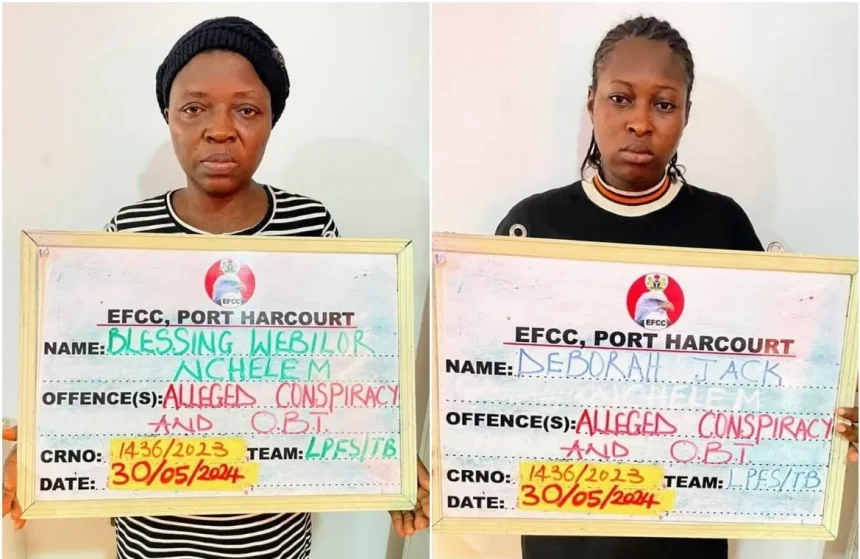The Port Harcourt Zonal Command of the Economic and Financial Crimes Commission (EFCC) has arraigned Blessing Nchelem and her daughter-in-law, Deborah Jack, before Justice P. I. Ajoku of the Federal High Court in Port Harcourt, Rivers State.
They are facing charges of criminal conspiracy, obtaining money under false pretenses, and retention of proceeds of unlawful acts, amounting to N6 million.
The charges, brought against the defendants, allege that between November 15, 2022, and March 21, 2023, at Port Harcourt, they conspired to defraud Senibo Richmond Opusunju. The alleged fraudulent transaction involved the sale of three plots of land located at Rumuapu, Rukpokwo, Obio/Akpor Local Government Area of Rivers State.
Deborah Jack, Blessing Webilor Nchelem, and Chimenem Peter Webilor (who is currently at large) are accused of obtaining N6 million from Senibo Richmond Opusunju as payment for the land, which they allegedly knew to be under false pretenses. This action is said to contravene Section 1 (1)(a) and punishable under Section 1 (3) of the Advance Fee Fraud and other Fraud Related Offences Act.
READ ALSO: EFCC Cracks Down on Dollar Transactions by Foreign Missions, Mandates Naira Use
Both defendants pleaded “not guilty” to the charges. The prosecution counsel, E. K. Esien-Otu, requested the court to fix a date for the trial and to remand the defendants in the custody of the Nigeria Correctional Service. Meanwhile, the defense counsel, S. O. Aburu, orally applied for bail for the defendants to adequately prepare for their trial.
Justice Ajoku declined the oral bail application and instructed the defense counsel to file a formal bail application. The court ordered the defendants to be remanded in EFCC custody pending the formal bail application and the commencement of their trial.
The arrest and subsequent arraignment of the defendants followed a complaint from a petitioner who alleged that he paid N6 million into the bank account of Deborah Jack for two plots of land. However, after payment, he discovered that he could not take possession of the properties as another person claimed genuine ownership. Despite efforts to recover his money, the petitioner was unsuccessful.
This case underscores the EFCC’s commitment to combating fraud and financial crimes in Nigeria.




